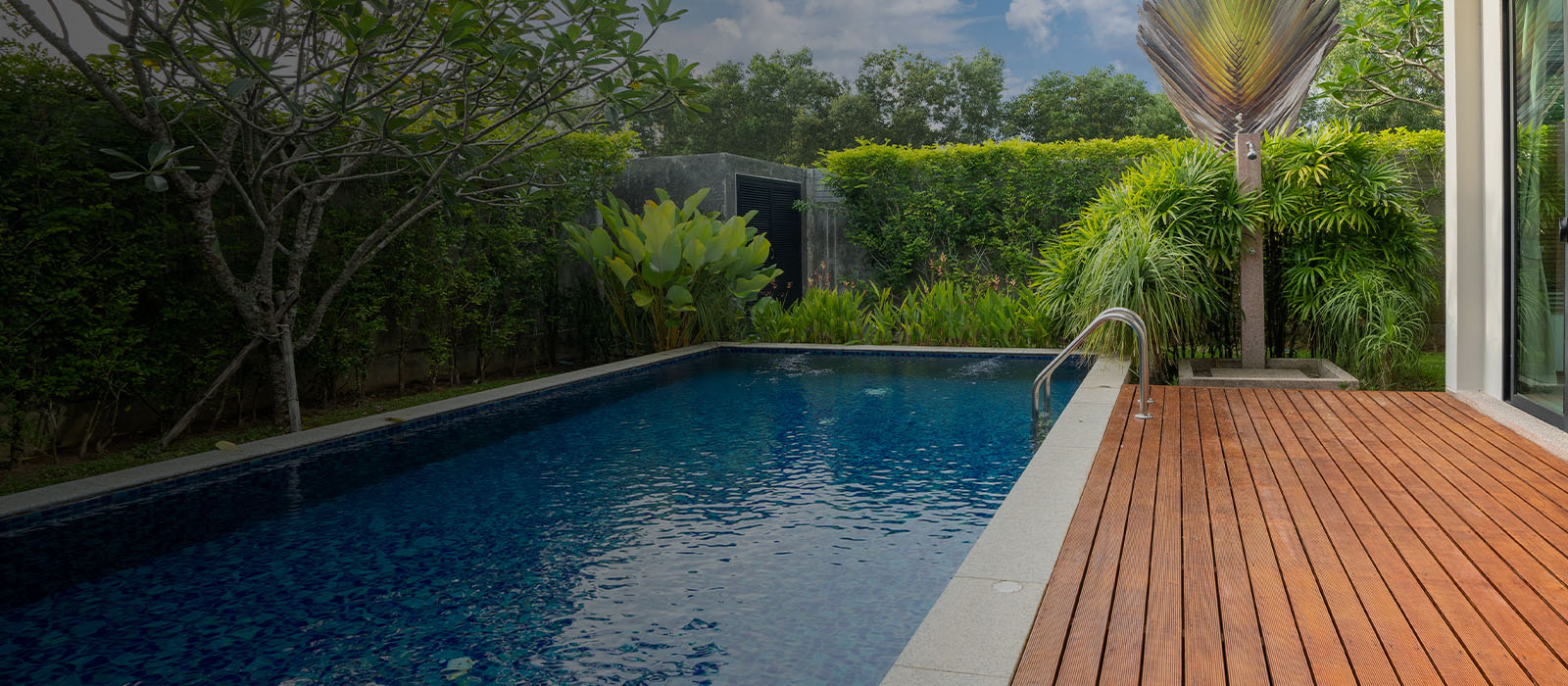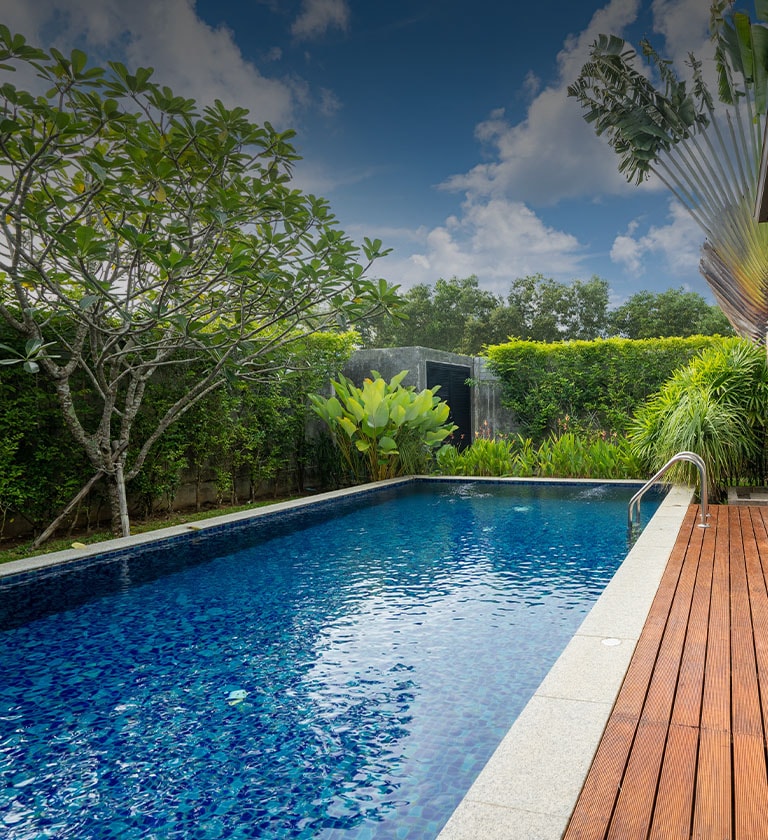-
Heated pools have become a symbol of luxury, offering a comfortable and consistent swimming. They not only allow homeowners to enjoy their pools beyond the summer months but also contribute to increased property value. A well-maintained heated pool can also become a central feature for gatherings, ensuring that the investment is not just about personal comfort, but also about creating a space for social connection and entertainment. However, heating a pool can be a complex and expensive endeavor.
This is where heat pumps make all the difference as a smart choice for homeowners. They provide a consistent and even heat, maintaining your pool at the desired temperature. Moreover, the operational costs of heat pumps are typically lower than those of traditional gas heaters, making them a cost-effective solution in the long term. And, with the capacity to heat or cool your pool water, heat pumps offer versatility that can adapt to your changing needs.
-
Q. What are Compressors and Refrigerants?
A compressor is a mechanical device that intakes low-pressure gas, compresses it through rotational or piston movement, and discharges it as high-pressure gas—often referred to as the heart of a refrigeration system. Refrigerants broadly encompass any substance that causes cooling. However, in the HVACR (heating, ventilation, air conditioning, and refrigeration) industry, refrigerants specifically circulate within the cycle of cooling devices, such as refrigerators, heat pumps, and air conditioners. They absorb heat at the low-temperature point (the evaporator) and release it at the high-temperature point (the condenser), facilitating the heat transfer essential for cooling and heating.
-
Q. What is The Mechanism of a Pool Heat Pump?


-
❶Compressor: Compresses low-pressure refrigerant gas into high-pressure refrigerant gas.
❷Condenser: Cools the high-temperature and high-pressure refrigerant gas to a lower temperature by dissipating heat to the surroundings, causing it to liquefy. The condenser plays a vital role in heating water in the heat pump.
❸Expansion Valve: Passes the liquefied medium-temperature, high-pressure refrigerant through a very narrow space to reduce pressure.
❹Evaporator: Evaporates the low-temperature, low-pressure refrigerant mixture into a complete gas by exposing it to higher temperature surroundings.
A heat pump operates through a sophisticated cycle that manipulates the state and pressure of refrigerant to move heat. The cycle begins with the compressor, where low-pressure gaseous refrigerant is compressed into a high-pressure gas, elevating its temperature significantly. Moving to the condenser, this high-temperature, high-pressure gas is cooled by the cooler ambient air around it, causing the refrigerant to condense into a liquid while releasing its heat to the outside. At this stage, the heat transfer occurs. The extracted heat warms the water and the heated water is supplied to the swimming pool through a water pump. Then, the liquid refrigerant from the condenser passes through the expansion valve, a narrow passage that reduces its pressure, resulting in a drop in both temperature and pressure, and causing some of the refrigerant to evaporate into gas, creating a low-temperature, low-pressure mixture of liquid and gas. Finally, in the evaporator, this mixture absorbs heat from the warmer surrounding air (ambient air), evaporating the refrigerant completely into a gas. This process of gaining heat causes the surrounding environment to cool down as the heat is extracted from it.
-
Q. What Compressors Are Recommended for Pool Heat Pumps?


-
The scroll compressor stands out as the optimal choice for heat pumps used in heating pools. It operates by meshing two spiral-shaped components—the fixed scroll and the orbit scroll—in relative motion to compress gas. The orbit scroll doesn't rotate on its own but orbits around the fixed scroll, progressively decreasing the volume of the compression chambers and moving the gas towards the discharge port at the center. This unique mechanism not only ensures high reliability but also significantly reduces noise and vibration, making it exceptionally suited for medium to large capacity models of pool heat pumps. Its efficiency and quiet operation align perfectly with the demands of pool heating applications, highlighting its suitability for ensuring comfortable and serene pool environments.
In addition, LG Compressor & Motor is preparing to introduce a 9-ton scroll compressor. This new product is expected to meet an existing market need by offering a 9-ton capacity solution. With this advancement, LG intends to facilitate the electrification of pool heating systems, making it possible to replace traditional gas heaters in a variety of applications.
To learn more about LG Scroll Compressor, please check out the video below.
-
Q. Why Should You Heat Your Pool with a Heat Pump?




-
Heating an outdoor pool with a heat pump can lead to considerable savings, especially when compared to electric resistance or gas pool heaters. Table 1 helps you estimate your annual heat pump heating costs by factoring in your location and desired water temperature — which significantly reduces heat loss. Table 2 goes a step further by calculating the potential savings of operational/heating costs* when opting for a heat pump heater. For instance, for every $1,000 spent on heating a pool using traditional methods, the table illustrates the amount you could save on operational costs by switching to a heat pump system. Particularly against gas heaters with a 55% efficiency, heat pumps emerge as a cost-effective solution. These tables provide valuable insight, allowing pool owners to make informed decisions that could lead to substantial savings in annual pool heating expenses.
*Not including purchase costs and installation costs
-
Q. What Are the Sustainability Trends in the Market?


-
The American Innovation and Manufacturing (AIM) Act, enacted in 2020, marks a pivotal shift towards environmental sustainability within the HVAC sector, targeting a substantial reduction in hydrofluorocarbon (HFC) usage—potent greenhouse gases—by 85% by 2036. ² This ambitious initiative is a direct response to the escalating concerns over climate change, aiming to significantly lower emissions from high Global Warming Potential (GWP) substances commonly used in refrigeration and air conditioning. ² The phasedown is meticulously planned, promoting the adoption of alternatives that promise to lessen the environmental impact of cooling systems. It not only underscores the urgency of addressing global warming but also highlights a collective move towards sustainability, driving the entire industry towards innovation and the use of low GWP refrigerants.
In alignment with the AIM Act's phasedown schedule, LG Compressors & Motor is actively participating by incorporating R454B refrigerant, which has a GWP of 467, into their pool heat pump models. This adaptation signifies LG’s proactive approach in transitioning to lower GWP refrigerants ahead of regulatory deadlines. For U.S. consumers, this shift towards HFC phasedown heralds a new era of cooling technologies that are not only safer for the planet but also optimized for energy efficiency. The transition, while significant, is designed to be seamless, ensuring that consumers will continue to enjoy high-performance cooling solutions without compromising on reliability or facing undue disruptions. The AIM Act, therefore, stands as a critical milestone in the journey towards a more environmentally responsible HVAC industry, benefiting both the planet and the people.


-
Conclusion
Embracing heat pumps for pool heating embodies a forward-thinking approach to cost-effective pool maintenance. The use of LG's scroll compressors, known for their efficiency and low GWP refrigerant usage, aligns perfectly with the goals of the AIM Act, guiding the industry towards environmentally conscious practices. By choosing heat pumps equipped with low GWP refrigerants like R454B, homeowners can significantly reduce their energy expenses and contribute to the global effort against climate change. This transition not only represents a step towards responsible alternatives but also ensures that the enjoyment of a heated pool comes with minimal greenhouse gas emissions. Ultimately, the adoption of heat pump technology for pool heating signals a commitment to lower GWP, making it a smart choice for consumers.
Reference
[1] https://www.energy.gov/energysaver/heat-pump-swimming-pool-heaters
[2] https://www.epa.gov/climate-hfcs-reduction/frequent-questions-phasedown-hydrofluorocarbons
[3]https://www.epa.gov/climate-hfcs-reduction/technology-transitions-hfc-restrictions-sector#refrigeration-ac-heat-pumps
Products In This Article
-
"The information contained in the article is released by LG Electronics and may not be used for personal work. It may not be copied, reproduced, modified, decompiled, or reverse-engineered into any other work without prior permission from LG Electronics."
-
*Products and solutions may vary according to country and operating conditions.
Please click the 'INQUIRY TO BUY' banner below to contact LG Sales Team for further information on solutions and products.







